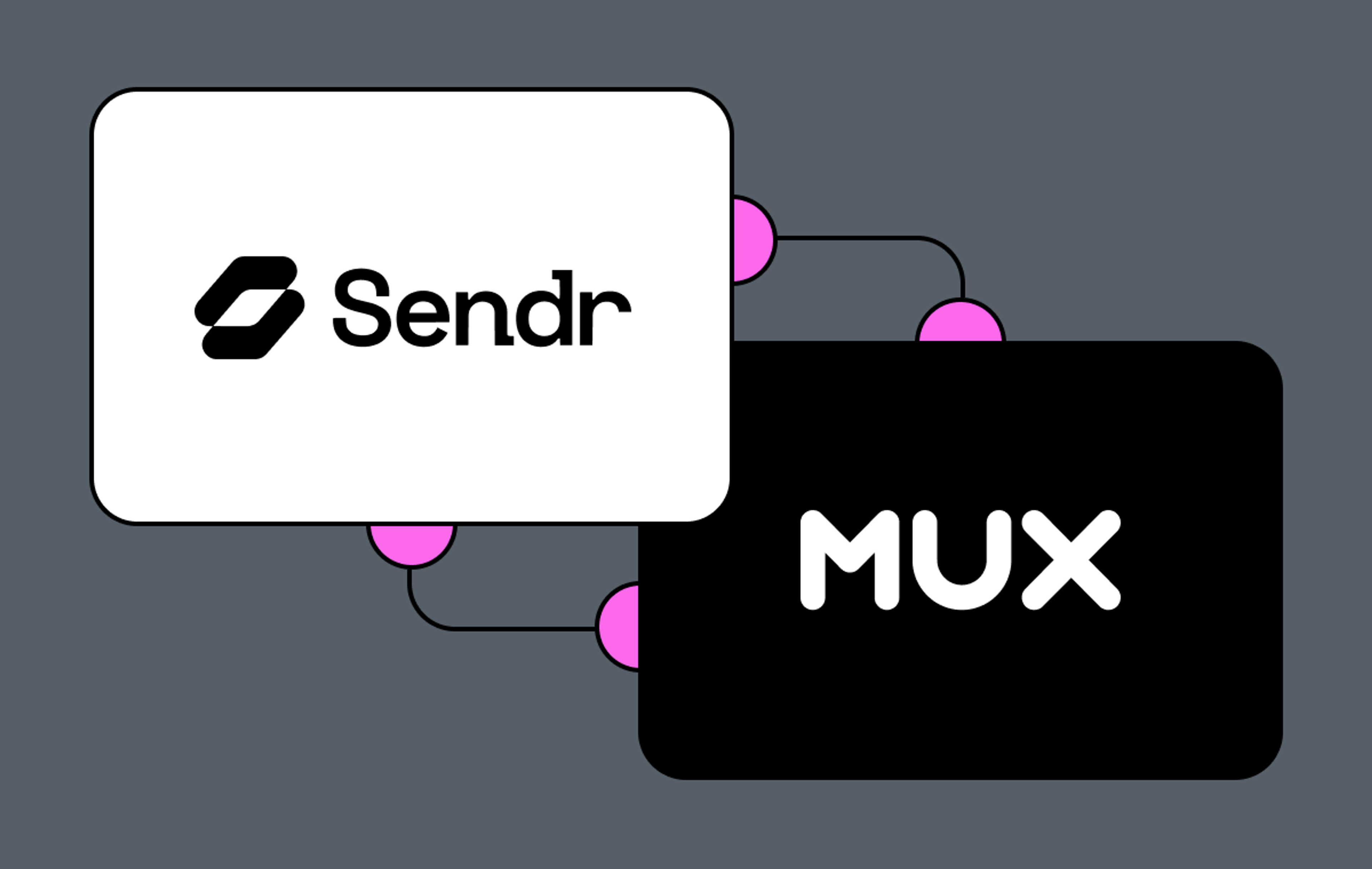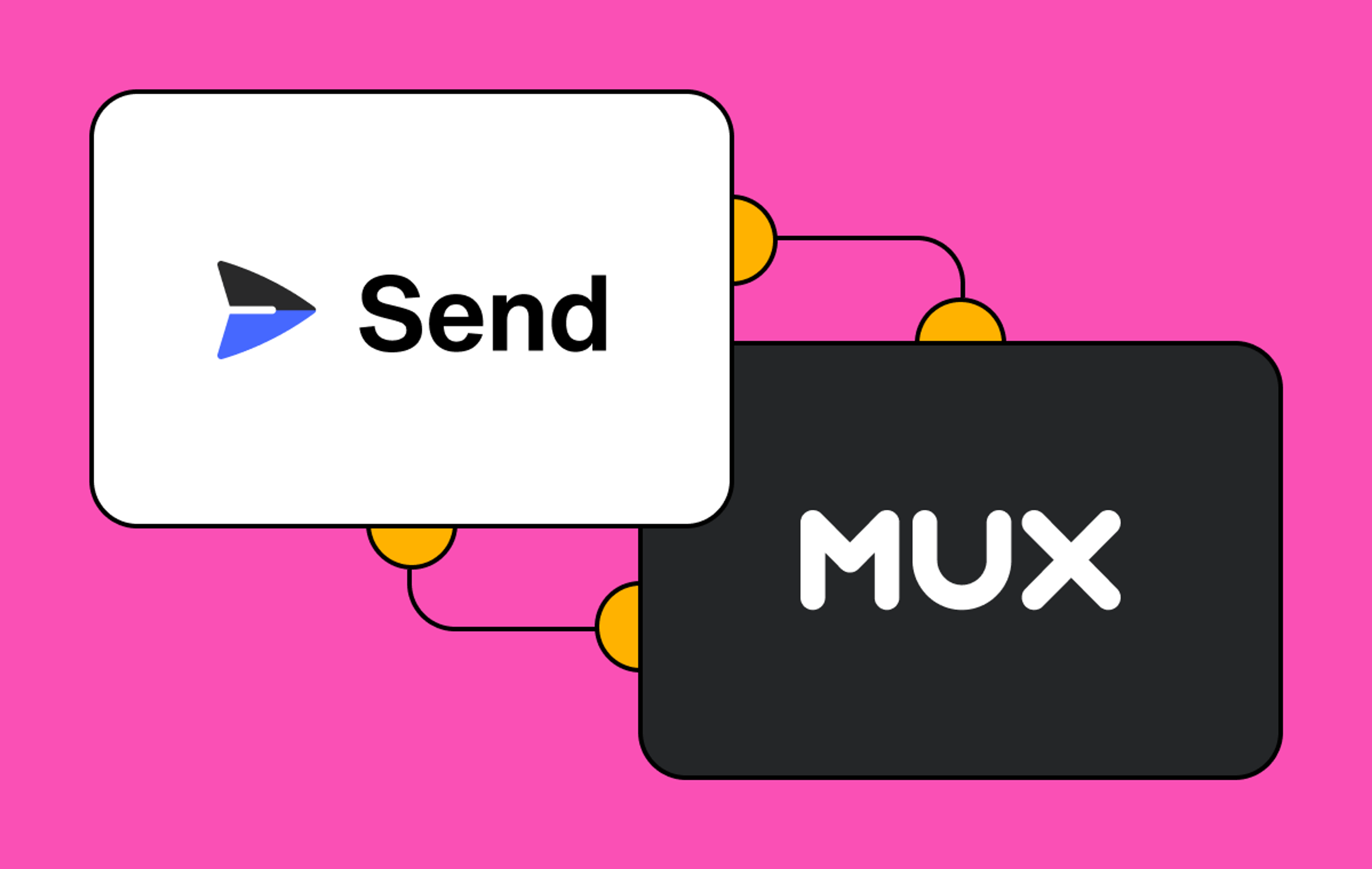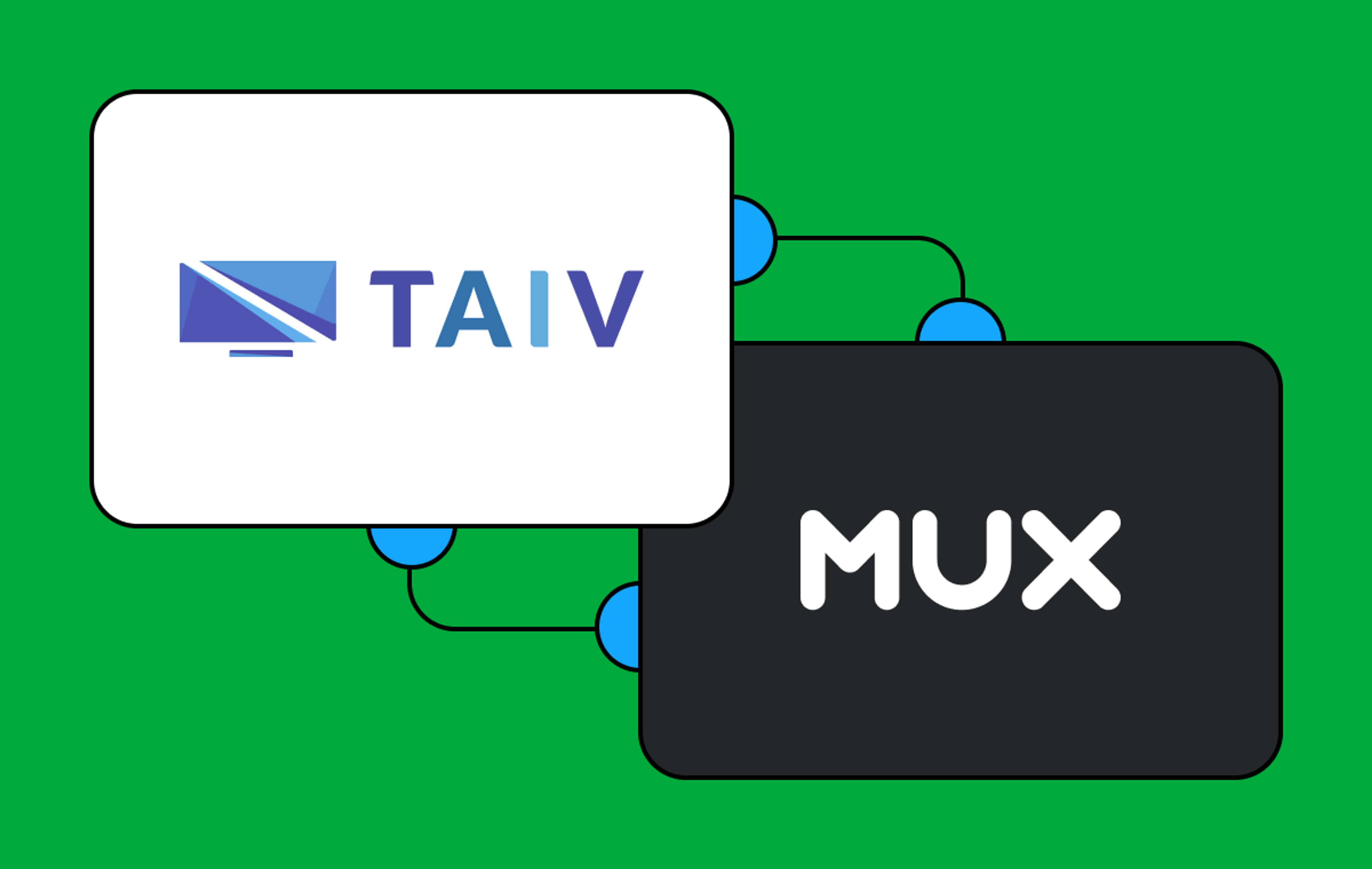Skool, a community platform, wanted to eliminate friction in their video workflow where users had to upload content to third-party platforms like YouTube or Vimeo before embedding it in their communities. With a small engineering team and ambitious roadmap, they needed a solution that wouldn't require building video infrastructure from scratch.
Using Mux, Skool launched native video in just 5 weeks — going from concept to 100% deployment without a gradual rollout. The result: 98% of uploaded videos get viewed (exceptional for user-generated content), community creators report significant cost savings on video hosting, and thousands of communities rapidly adopted the feature. Skool now offers native video free to all users on both pricing plans, using Mux's scale to absorb hosting costs while increasing engagement and removing barriers for community creators.
Watch as Matt McClure, Co-founder of Mux, chats with Andrew Crowe, Engineering Manager at Skool and Andrew Kirby, Skool Community Lead about their story. Or read the conversation below.
Andrew Crowe, Engineering Manager at Skool: Embedding native video makes it a lot easier for the communities to, uh, share and grow and learn together. And it protects the content for these people that are investing a lot of their time and energy to build their communities on Skool.
Andrew Kirby (Kirby), Skool Community Lead: We want to be the best platform for the most people and for the least price. So native video is available in both plans for free. For all of the creators and all of the users inside of the platform. We've, we're, we're taking the cost on ourselves, and Mux has allowed us to do that.
Matt McClure, Co-founder of Mux: Hi, uh, I'm, I'm Matt McClure. I'm one of the co-founders of Mux. I'm thrilled to be here with Kirby and Andrew from one of our new favorite customers Skool.
Real quick, Andrew, you wanna, you wanna show us your shirt? I'll show my shirt. Video nerd. Video nerds represent here. You, you said you're, you're brought in video natively.
Can you walk me through like what were the, what were the video challenges you were trying to solve? Or, or like, what did it look like before, before Mux came to the party?
Andrew: Yeah, absolutely. So, um, previously and still, uh, now, uh, users would, uh, upload videos to YouTube or Vimeo, Loom, you know, a variety, whatever they wanted really and then embed that into school for their courses. Uh, or if they wanted to do a post or you know comment, uh, with a video link.
And so that's, there's a pretty high barrier there, uh, of like, well, I've gotta record my video now I've gotta go to another platform upload that, wait around for a while for that to finish processing. Then I've gotta make sure that it is like publicly available, but also delist it. 'cause I want people to go to my Skool community to view this, and then I link it there.
Uh, and so there's like a multi-step process and, and really we just wanna lower that, that burden of like so many platforms and we want school to be a, a singular place for this community.
And so that's where a native video comes in for group owners or admins to create their courses. They can drag them right into Skool and now you can only view them on Skool as opposed to a YouTube link that somebody could just, you know, network inspector or, you know, copy the YouTube link and then share it anywhere else.
Kirby: There was a post that we made when it was announced and the amount of fire emojis, the amount of people being thrilled was insane.
Andrew: You know, we've had in that post some, some community leaders with really large communities who were like, wow, I'm gonna save a thousand dollars or $1,500 a month on my video hosting. But by just moving over to school native video. We've seen a lot of, you know, improved engagement in posts from the community members. Skate life, uh, professional skateboarder. Helping the community, the skate community grow together, you know? And so he is like, "Hey, try a 180 variable with heel flip. I think that's right. Uh, and now rather than having to record yourself, upload it, you know, you just record it, bam, right in there and you can get feedback from the community, from the leaders, uh, just instantaneously.
Matt: Why, why choose Mux? What was that, uh, like, what was that like light bulb moment for you when you realized that that Mux could be a, a fit or solve these problems?
Andrew: Yeah, Skool's a startup, right? The so, so, you know, we we're not a, we're not a multinational conglomerate. Uh, we have very small engineering teams with very full roadmaps. So, uh, looking at everything we want to do and the scope of effort of building a, you know, ingest pipeline, storage platform, delivery, all of that stuff is like we should consider other options.
And I've been doing video for a long time. I've used Mux Data, uh, for four or five years at previous, uh, um, you know, jobs and just really loved that platform. Familiar enough with the API. Uh, and so it wasn't really a light bulb moment of like, maybe Mux, it was kind of, Mux was for us, it was the starting point.
Once we said, Hey, we are not gonna build this fully ourselves right now. We, we started with Mux and we did our due diligence of, uh, looking at other platforms. We looked at the, the technical performance, the feature set the the finances and Mux was just number one in all of them. And so it was a really easy decision to make.
Let's go with Mux and you know, we were able to build with that leverage of the excellent APIs and the features that we need. I think it was from saying, yeah, we're gonna do it with Mux — it was about five weeks to going live and the confidence that we had in the product. We didn't even do a slow rollout. We said uh, on our, on our weekly broadcast, Hey, native live is here and we flipped the switch and a hundred percent deployment. So, uh, and it worked, you know, really, really, uh, um, low amount of issues and a lot of happy users.
Matt: Yes. Music to my ears.
Any, any specific, uh, Mux features or capabilities that stood out? Like, or, you know, I always love hearing about like, interesting use cases of thumbnails and workflows or whatever else, but any, anything in there specifically that you were like, ah, man, cool, I'm glad we got it.
Andrew: Um, yeah, I, so I'll, you know, a technical side for me, uh, is the upload component, you know, the multi-part upload UpChunk I think you guys call it. Uh, so just being able to dry it, like drop that component right in. And we don't have to deal with multiple signed URLs and stitching those things back together, all that, you know, just, here's the thing and it works. Uh, and its fast, right?
Uh, so, so the technical side is that the, the thing that like stands out for me though more than that is the people at Mux. Um, I've been doing video for a long time. I have a pretty high bar. Uh, and I'm not shy about needing that bar to be met. And so, uh, I've been a little bit noisy about some of the things as we, you know, come up on hurdles. Some of them us, but you know video's hard. So there are gonna be issues and our users are doing their own thing, so, every step of the way, regardless of how annoying I might be, everybody at Mux has just been a pleasure to work with.
And so that's the real thing. It's, it's, you've kind of solved the video is hard problem, and now it's like the, but the people are great.
Matt: It's also good to hear the, the shout out to Upchunk. I actually, I wrote that, uh, years ago, initially.
Uh, what would be, I mean, outside of just like, you know, you're, you're a startup, so not having to build out like a big video infrastructure team is probably, I assume that's a big win. Yeah. But like, I don't know what would be, what would be impossible or a lot more difficult, uh, if, if Mux wasn't in the picture.
Andrew: I mean, literally everything. Like, um, we, we went from concept to full production, a hundred percent deployment in about five weeks. Like we're just not gonna be able to do that.
The uploader itself is gonna be uh, probably that amount of time just to implement, right?
And so, um, so there's that, just the, the baseline feature set, uh, is so comprehensive. We didn't really have to worry about any of the things that, you know, thumbnail creation, the hover scrub sprite sheet, uh, all of that.
The Mux Player integrated right into Mux Data. So we have analytics and we know we're getting our, you know, engagement, um, so that we can see, hey, actually on posts, uh, it's about 98% of videos get views, which is for UGC is an insane rate. Uh, so that's, that's huge for us to be able to figure that out, right?
Um, and so all of those things on the technical side are just, uh, impossible to do without a partner like Mux.
Kirby: Another thing on the member side is that Skool is a community platform. So we have a community for our community owners. Sometimes you can say things that you later regret.
When people ask, when is native video gonna be out? And you tell them, ah, it's gonna be out soon. And then when it comes to actually building it, the engineers are like, this is not gonna be out soon.
If we were to build it ourself, all of those promises that we had made to customers that it was gonna be out soon wouldn't have been met. So having a partner like Mux allowed us to get it out so much quicker to the point that customers were like, how did you build that so quickly? I have no idea how we've got native videos so soon. So that was really cool as well.
Andrew: Yeah. If we were to go and build fully true native on AWS, we'd have to do like five year long commits, uh, with these growth plans. Uh, and you know, we're just not, we're just not there yet. So leveraging Mux's scale is part of what has allowed us to give it away to every user for free as just part of this is Skool, right? It's a baseline feature of Skool.
Kirby: And there's other competitors that charge the creators for native video. Yeah. And there's also competitors that charge the members to upload longer videos, and we didn't wanna do either of those things.
Andrew: Yeah.
Matt: The 98% of people, the 98% of video upload being viewed at all is kind of a crazy stat.
Uh, is there any statistic around like uptick of native video? Like how many of your communities. are utilizing video in some way.
Andrew: Uh, thousands, thousands of communities, uh, are engaging with this. It is, it has very quickly become the predominant usage of video. You know, folks are still using YouTube or Vimeo or you know, the others, um, because that's part of their flow and we've seen a, a very quick uptick in usage. Really. It's exciting new addition in the platform.
But those that have their flow are starting to peel off and, and say, I'm gonna stop sending my video over there. I'm gonna start bringing it in. Uh, and so a large initial influx and then just steady growth, uh, for, for groups and members.
And as each group kind of starts getting used to it and understanding how it works, we're seeing them start to encourage their community, say like, hey, don't do the old flow, like drag and drop your stuff right in it's way better. And so we're seeing those community leads telling their community members use the Skool video. It's really good, right?
It was, uh, it was particularly fun. The first, like two days of turning this live for everybody was, uh, are the videos were coming in like five to 15 seconds long. It was like, that is not what I expected. Oh, but then, then it equalized and you started moving courses and posts and stuff over to native and we saw those go up and what we realized is that was just everybody being excited, taking a quick video, being like, oh my God, it's here and uploading it. And so they were just, it was a lot of real quick phone videos. Oh my, is it, does it work? And then they'd be excited. And then over the next several days they start moving their content in.
Matt: That's awesome. Any, uh, I mean, I know it's, it's fresh, but any, any initial signs around like, impact? Like, are you seeing more folks, you know, for the communities that have started using this and utilizing it more. , are you seeing like more engagement there? Like can you point to any positive signs for the business after adding it?
Andrew: It's, yeah, it's kind of tough because we, we also launched the $9 hobby plan the next week, and so that, that little bit of lag of like, it took a couple of days for folks to, to get used to it and start using it. And then we introduced Hobby Plan, and so yeah, our graphs are going way up as they go to the right.
Kirby: Let's just say it was Mux.
Andrew: It's both of them.
Matt: It's definitely video.
Andrew: It's definitely, it's Mux on the $9 hobby plan, I think is the The killer combo. Yeah. Right. Yeah.
Kirby: And even not from a statistics point of view I know lots of creators personally that have moved across because of native video.
I have one friend who has a community of guitar players. He helps people get better at guitar. And he was just like, for years, probably four or five years, he was like, I can't move across. I can't move across because everyone uploads videos and I review them. Getting them to use YouTube or Vimeo or Wistia or Loom, it's too complicated. And as soon as we released it, he moved across.
Andrew: Yeah.
Kirby: So that's just one guy. But I'm sure if there's one guy that's lots of other people.
Matt: So yeah. Are you guys already using, you know, transcripts, captions, things like that? Uh, you know, either, either as part of these workflows but also just accessible, like general accessibility, like how are you thinking about that in terms of, uh, the video side of your community?
Andrew: Yeah, uh, definitely. We, we are using it on every video right now, and that's something that we're looking at maybe giving the community members an option to turn that off, uh, or select the languages. Again, we, we kind of built the, the minimum viable product that actually just hit all of the, the core features that we needed.
But with the language options that Mux provides, we're gonna look at, you know, making that selectable by the group. We want to add in the functionality to do multiple language transcriptions, you know, if there's multiple audio tracks or if there's, you know, if Kirby were speaking French and I'm English, you know, we go back and forth we want to have both options.
But we're definitely using those and, and the community at large is really appreciative uh, 'cause now you can, you can watch your Skool courses, you can watch the content on the bus, right, or on the train and read along. You know, if it's too noisy or you don't have headphones, uh, it just provides you an another layer, another option.
Matt: If you were, if you were recommending Mux to another, a dev, another dev, thinking about building something, like facing similar video challenges, whatever else, uh, what would, what would you tell them?
Andrew: Don't do it yourself from the start. Uh, you know. Hosting video at scale, at broad scale is, is a lot more than just wrapping FFmpeg.
I mentioned the, the uploader itself. That's a fair amount of work and for that to be proven and reliable and, and battle tested for years, right, is something that you, you don't just get when you whip out some code and, and deploy it.
We are, we are growing, uh, we have a lot of video coming in. We're getting a lot of views and the views are continuing to grow. And if we were just doing it ourselves, we'd be paying retail rates for CDN, right? Because we don't wanna make that five-year commit because we don't, we don't know. We're still learning as we grow. And Mux has done all of that work, right? Um, multi-platform, multi-CDN delivery at the lowest CDN rates. Uh, I think you guys also have your own CDN to some extent.
And so that's all stuff that you don't want to do with a small team, um, 'cause you'll just be underwater instantly. So, um, at the very least, start with Mux. Use Mux Data. Figure out how your product is being used, and then if you're really insistent, then you can start to peel away certain parts, you know, as you grow or you know, if you wanna go build your own CDN, go for it. Uh, I recommend against that. Uh, but yeah, start, uh, start with Mux, uh, and then um, see what you can do after that.
I think the, the core thing, the theme for Skool is community. I think the Mux, you know, is a big part of the video engineering community and so it just felt really natural to, to blend the, you know, to become partners. Um, you guys are not like a faceless corporation and as I said, the people are just great to work with and as people that I've known for a long time, 'cause you're, you're leading a lot of the effort for making video doable, right, and, and lowering those barriers.
And so yeah, the Skool community aspect, the Mux, community, Demuxed, all of the other things, um, was a, just added to that natural fit.
Matt: Awesome. Thank y'all so much. Really appreciate it. Like, but thanks for the kind words and thanks for doing this.
Andrew: Uh, of course. Yeah.
Matt: I'm thrilled you guys are, uh, use us. It's been amazing.




